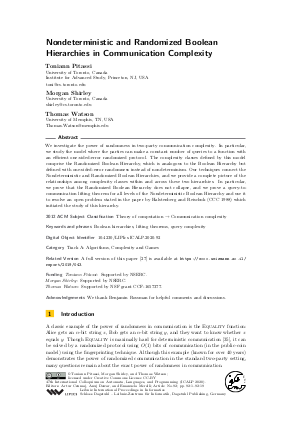@InProceedings{pitassi_et_al:LIPIcs.ICALP.2020.92,
author = {Pitassi, Toniann and Shirley, Morgan and Watson, Thomas},
title = {{Nondeterministic and Randomized Boolean Hierarchies in Communication Complexity}},
booktitle = {47th International Colloquium on Automata, Languages, and Programming (ICALP 2020)},
pages = {92:1--92:19},
series = {Leibniz International Proceedings in Informatics (LIPIcs)},
ISBN = {978-3-95977-138-2},
ISSN = {1868-8969},
year = {2020},
volume = {168},
editor = {Czumaj, Artur and Dawar, Anuj and Merelli, Emanuela},
publisher = {Schloss Dagstuhl -- Leibniz-Zentrum f{\"u}r Informatik},
address = {Dagstuhl, Germany},
URL = {https://drops.dagstuhl.de/entities/document/10.4230/LIPIcs.ICALP.2020.92},
URN = {urn:nbn:de:0030-drops-124992},
doi = {10.4230/LIPIcs.ICALP.2020.92},
annote = {Keywords: Boolean hierarchies, lifting theorems, query complexity}
}

 Creative Commons Attribution 3.0 Unported license
Creative Commons Attribution 3.0 Unported license


